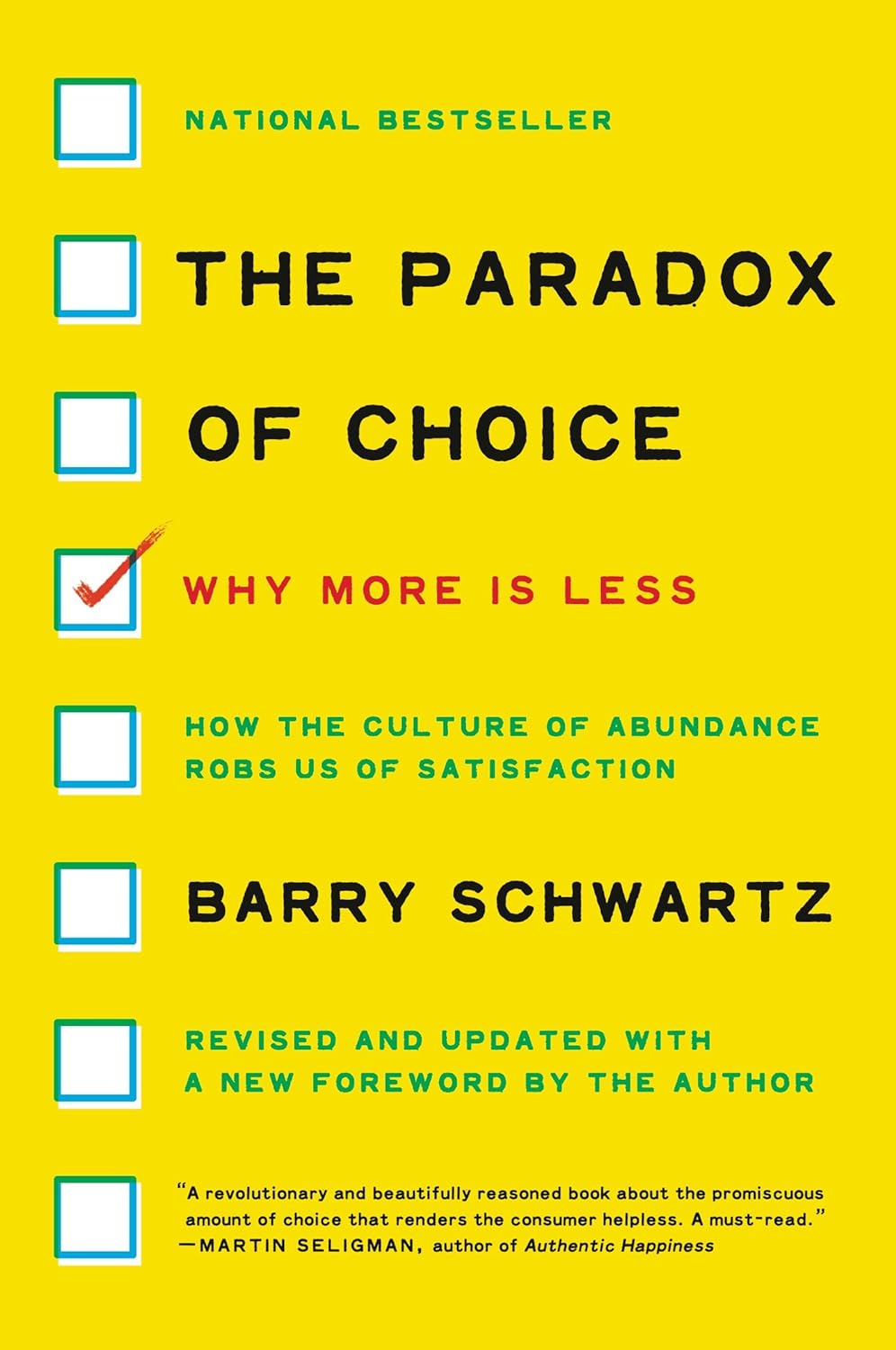Choice Overload
In "The Paradox of Choice," Barry Schwartz delves into the fascinating concept of choice overload, revealing how an abundance of options can lead to anxiety, indecision, and dissatisfaction. Schwartz's insights shine a light on the hidden downside of our consumer-driven world, where more choices do not necessarily equate to more happiness.
Schwartz explains that having too many options can be overwhelming and counterproductive. He describes a study conducted in a supermarket where shoppers were presented with a display of 24 different types of jam. While many stopped to look, only a few actually made a purchase. In contrast, a display with just six types of jam attracted fewer onlookers but resulted in significantly more sales. Schwartz states, “The presence of choice might be appealing as a theory, but in reality, people find more and more choice to actually be debilitating.”
This phenomenon is a classic example of choice overload. When faced with too many options, people often experience decision paralysis, where making a choice becomes so daunting that they avoid it altogether. Schwartz highlights, “Clinging tenaciously to all the choices available to us contributes to bad decisions, anxiety, stress, and dissatisfaction — even to clinical depression.”
Moreover, even when a decision is made, the abundance of choices can lead to increased dissatisfaction with the chosen option. Schwartz discusses how people tend to second-guess their decisions, wondering if one of the many other options might have been better. This constant comparison and fear of missing out can diminish the joy and satisfaction derived from the chosen product or experience.
Schwartz's compelling arguments and real-life examples illustrate how simplifying our choices can lead to greater happiness and contentment. He encourages us to focus on what truly matters and to limit our options to those that align with our core values and priorities. By doing so, we can avoid the pitfalls of choice overload and find greater satisfaction in our decisions.
Maximizers vs. Satisficers
Maximizers are those who strive to make the absolute best choice in every situation. They meticulously evaluate every option, constantly seeking the optimal outcome. While this might sound like a smart approach, Schwartz reveals that maximizers often end up feeling less satisfied with their decisions. He explains, “Maximizers are prone to second-guessing themselves, regretting their decisions, and feeling less happy with the results.” This relentless pursuit of perfection can lead to anxiety and regret, overshadowing any potential joy derived from their choices.
On the flip side, satisficers adopt a more relaxed approach. They set criteria for what they want and choose the first option that meets their standards. Satisficers understand that "good enough" is often more than sufficient. This mindset leads to greater contentment and less stress. Schwartz highlights, “Satisficers are generally happier with their decisions and experience less regret.” By not fixating on the elusive "best," satisficers free themselves from the burden of exhaustive comparisons and enjoy a more fulfilling experience.
Schwartz backs up his claims with compelling research, showing that satisficers tend to be more content and less prone to decision fatigue. He quotes, “Satisficers end up happier with their choices and feel less pressure, as they are not constantly seeking perfection.” This practical wisdom can be applied to various aspects of life, from choosing a meal at a restaurant to making significant career decisions.
By understanding the differences between maximizers and satisficers, Schwartz provides a roadmap to a happier, more balanced life. Embracing a satisficing mindset can help reduce the stress and dissatisfaction that often accompanies the quest for the perfect choice. As Schwartz eloquently puts it, “Sometimes, good enough is good enough.” This powerful message encourages us to find joy in making decisions without being bogged down by the endless pursuit of perfection.
Regret and Anticipated Regret
Barry Schwartz delves into the powerful concepts of regret and anticipated regret, revealing how they can profoundly impact our decision-making and overall happiness. Schwartz explains that the fear of making the wrong choice often leads to a paralyzing state where we second-guess our decisions, ultimately diminishing our satisfaction.
Schwartz points out that with an abundance of choices, the potential for regret increases exponentially. When faced with numerous options, we can't help but wonder if there might be something better out there. This endless pursuit of the "perfect" choice can be exhausting and counterproductive. He writes, “The more options there are, the easier it is to regret anything at all that is disappointing about the option that you chose.”
Anticipated regret, the fear of future regret, can be equally debilitating. This preemptive anxiety about making the wrong choice can lead to indecision and missed opportunities. Schwartz emphasizes that anticipating regret often causes us to delay decisions or avoid them altogether, resulting in more stress and less satisfaction. He states, “The anticipation of regret, the fear that we will later wish we had chosen differently, can be a powerful motivator to avoid making a choice at all.”
To illustrate these concepts, Schwartz shares compelling examples and research findings. He describes how shoppers who meticulously compare every possible option often end up feeling less satisfied than those who make quicker, more intuitive choices. This constant comparison heightens the likelihood of regret, as people focus on the potential benefits of the options they didn’t choose rather than appreciating the value of what they did select.
Schwartz also highlights strategies to mitigate regret and anticipated regret. One effective approach is to embrace the idea of "satisficing" rather than maximizing. Satisficers are content with options that meet their criteria, rather than seeking the absolute best. This mindset shift can significantly reduce the burden of regret. “To satisfice is to settle for something that is good enough and not worry about the possibility that there might be something better,” Schwartz explains.
Opportunity Costs
In "The Paradox of Choice" by Barry Schwartz, the concept of opportunity costs is brilliantly illuminated, shedding light on how our decisions are often weighed down by the alternatives we didn't choose. Schwartz delves into how the mere act of making a choice inherently involves forgoing other options, and this can significantly impact our satisfaction and happiness.
Opportunity costs refer to the benefits we miss out on when choosing one option over another. Schwartz eloquently explains, “Every choice we make has a cost, and that cost is the value of the best alternative that we have given up.” This means that while selecting one option, we are constantly aware of what we might be losing by not choosing the others.
Schwartz illustrates this with everyday scenarios that resonate deeply. For instance, when deciding on a new smartphone, the plethora of features and models available can make us second-guess our final choice. We might settle on one phone, but thoughts about the features of the phones we didn’t choose can lead to dissatisfaction. “The more options there are, the more likely it is that we will experience regret,” Schwartz points out, emphasizing how opportunity costs play a crucial role in our decision-making process.
He also highlights how the awareness of opportunity costs can lead to decision paralysis. The fear of missing out on better alternatives can make it incredibly difficult to make any choice at all. Schwartz says, “When there are lots of alternatives to consider, it is easy to imagine the attractive features of alternatives that you reject and thus be less satisfied with the alternative that you have chosen.”
But it's not all doom and gloom. Schwartz provides insightful strategies to manage opportunity costs effectively. He encourages us to focus on our core values and priorities, which can help narrow down choices and reduce the feeling of missing out. By aligning our decisions with what truly matters to us, we can minimize the impact of opportunity costs and feel more content with our choices.
Adaptation and Happiness
Barry Schwartz dives deep into the fascinating relationship between adaptation and happiness, offering profound insights that can transform how we view our choices. Schwartz highlights the concept of hedonic adaptation, where individuals quickly return to a baseline level of happiness after positive or negative changes in their lives.
Schwartz explains that while we often think achieving certain goals or acquiring new things will bring lasting happiness, the reality is quite different. “We adapt to both the good and the bad, which means that the impact of any change tends to diminish over time,” he writes. This adaptation means that the excitement of a new purchase or the sting of a setback will both fade, bringing us back to our original state of happiness.
One of the key takeaways from Schwartz’s discussion is the importance of understanding this adaptive nature of our happiness. By recognizing that our emotional responses to changes are temporary, we can make more mindful decisions and avoid the trap of constantly seeking new pleasures that ultimately won’t bring sustained satisfaction. Schwartz quotes, “Knowing that we will adapt can help us to make better choices that are more aligned with our long-term well-being.”
Schwartz also points out that our tendency to adapt has significant implications for how we approach choice. When we focus too much on finding the perfect option, we often overestimate the long-term happiness it will bring. Instead, understanding adaptation allows us to appreciate what we have and make choices that are good enough, reducing stress and increasing overall contentment.
Moreover, Schwartz’s insights into adaptation encourage us to invest in experiences over material goods. Experiences tend to bring more lasting happiness because they contribute to our personal growth and social connections, which are less susceptible to hedonic adaptation. “Experiences linger in our memories and shape who we are,” Schwartz notes, emphasizing their lasting impact on our happiness.
Simplifying Choices
Barry Schwartz delivers a powerful message about the joy and freedom that comes from simplifying our choices. Schwartz argues that in a world overflowing with options, simplifying decisions can lead to greater happiness and satisfaction.
Schwartz presents compelling evidence that having too many choices can be paralyzing. He explains, “The more options there are, the easier it is to regret anything at all that is disappointing about the option that you chose.” By simplifying our choices, we can avoid the anxiety and second-guessing that often accompany decision-making.
One of the key strategies Schwartz suggests is to embrace the concept of “good enough.” Instead of striving for perfection, which can be elusive and stressful, focus on what meets your needs and values. Schwartz notes, “The key to happiness is to have low expectations.” This doesn’t mean settling for mediocrity, but rather recognizing when a choice is satisfactory and letting go of the endless pursuit of the best.
Schwartz also advocates for setting limits on the number of options we consider. He shares, “Choice within constraints is what makes us feel empowered.” By consciously narrowing our options, we can make more confident and satisfying decisions. This approach not only saves time but also reduces the mental burden associated with overanalyzing every possible choice.
Another practical tip Schwartz offers is to prioritize decisions based on what truly matters. Focus on making thoughtful choices in areas that significantly impact your life and simplify decisions in less critical areas. This strategy allows you to conserve energy for what’s most important and enjoy a more balanced, less stressful life.
In addition to personal decision-making, Schwartz highlights the benefits of simplifying choices in professional settings. He explains how organizations can improve employee satisfaction and productivity by reducing the complexity of choices employees face. “Too much choice can be a bad thing, leading to decision fatigue,” Schwartz warns, suggesting that streamlined options can enhance both individual and organizational well-being.

